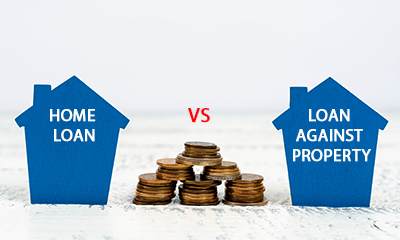Tax Benefits on Home Loans [FY 2023-2024]
![Tax Benefits on Home Loans [FY 2023-2024]](https://aadharhousing.com/public/storage/BlogImages/33//66df03d3c87dd.jpg)
Tax Benefits on Home Loans [FY 2023-2024]
These benefits are provided under various sections of the Income Tax Act, designed to incentivize home ownership and encourage investment in real estate. For the financial year 2023-2024 (FY 2023-24), several key sections offer tax deductions related to home loans. This article thoroughly explores the provisions under Sections 80EEA, 80C, and 24, highlighting their eligibility criteria, benefits, and implications for taxpayers.
Understanding Home Loan Tax Benefits
The government provides home loan tax benefits as incentives to promote homeownership. These benefits are designed to make buying a home more affordable by offering tax deductions on the interest paid on home loans and certain other financial perks. For instance, homeowners can claim a deduction on the interest component of their home loan under Section 24 of the Income Tax Act. Additionally, under Section 80C, individuals can claim a deduction on the principal repayment amount. These incentives encourage people to invest in real estate, boosting the housing market and contributing to economic growth."
Key Sections of the Income Tax Act Relevant to Home Loans
-
Section 24: Deduction on interest paid.
-
Section 80C: Deduction on principal repayment.
-
Section 80EE: Additional benefits for first-time homebuyers.
-
Section 80EEA: Benefits for affordable housing.
Tax Benefits Under Section 24
Eligibility Criteria:
1. The loan is available for acquiring, constructing, rehabilitating, reconstructing, or renovating a dwelling, allowing for new home purchases, plot construction, and repairs or renovations.
2. The property can be used for personal use or rented out for income, accommodating both personal living and investment purposes.
3. Loans must be secured through banks, financial institutions, or credit providers, reducing risk and offering good terms. Borrowers can choose from various institutions like commercial banks and housing finance companies to find the best option.
Conditions for Claiming the Deduction:
1. Thus, for a self-occupied property, the maximum deduction of Rs. 200000 per annum on repaid interest on the home loan is allowed.
2. Where the property is for let-out, the entire interest on the home loan can be brought as a relief under the Act.
3. The construction or acquisition of the house property must be completed within a duration of not more than 5 years from the end of the financial year in which the loan was advanced.
4. When a house takes more than the time allowed for construction, then the amount which can be deducted is 30,000 rupees.
5. The interest incurred in respect of the construction or acquisition of the property is allowed as a deduction only from the year in which the construction was completed or the property was acquired.
Tax Benefits Under Section 80C
Eligibility Criteria:
1. In the case of secured loans, the loan has to be taken to purchase or construct a new house property.
2. You are prohibited from disposing of the property within the five financial years following the financial year you obtain possession.
If you are using the loan primarily to purchase or build a new home, you are following the first point of the code by default. As for the second aspect, you are held personally liable for failing to sell the property in the next few months.
Conditions for Claiming the Deduction:
1. As per section 80C, you are allowed a tax exemption of 1,50,000 per year for repaying the interest portion of the home loan.
2. This section also allows claiming stamp duty and registration charges up to an overall limit of ₹1,50,000.
3. The deduction is restricted solely to the extent that the payment is towards the principal amount of the loan.
4. However, if the property is sold within 5 years, the deductions claimed will be added back to the income of the year in which the property is sold.
Additional Tax Benefits Under Section 80EE
Eligibility Criteria:
1. The loan should be sanctioned between 1 April 2016 and 31 March 2017, and all the documentation required for the loan issuance should be completed during this period.
2. The borrower needs to ensure that the amount being taken as a loan does not exceed ₹35,00,000; this would be against the lending institution's set financial policies.
3. Then, the borrower should be careful so that the value of the property does not exceed ₹50,00,000, which ensures that the customer keeps conforming to the property value regulations.
4. To ensure compliance with the specified conditions of the loan, the taxpayer would be required not to own any other residential property as of the date of sanction of the loan.
Conditions for Claiming the Deduction:
-
An additional deduction of up to ₹50,000 per annum can be claimed on the interest paid on the home loan.
-
This deduction is over and above the deduction of ₹2,00,000 allowed under Section 24(b).
Additional Tax Benefits Under Section 80EEA
Eligibility Criteria:
1. Banks and financiers who are required to approve the loan must do so within the period beginning 1 April 2019 and ending 31 March 2022.
2. The stamp duty value of the property should not exceed ₹45,00,000 to ensure that it does not fall under section 80C of the Indian…
3. Regarding Section 80EE, the taxpayer has no valid grounds for claiming on this regulation, which implies he or she must meet several conditions whereby the law does not allow this deduction.
4. One critical requirement is that the taxpayer must not own any residential property when sanctioning the loan so that first-time home buyers can take advantage of this provision.
Conditions for Claiming the Deduction:
1. The second deduction allowed in this section is also similar. An individual can deduct up to ₹1,50,000 on the home loan interest paid annually.
2. This deduction is in addition to the one provided for in section 24 (b) and is claimable as long as the loan is repaid.
Tax Benefits for Joint Home Loans
Sharing Tax Benefits Between Co-Borrowers
Each co-borrower can claim deductions individually when a home loan is taken jointly. This means each co-borrower can claim the interest deduction of ₹2 lakh (under Section 24) and the principal deduction of ₹1.5 lakh (under Section 80C), effectively doubling the tax benefits.
Conditions for Claiming Deductions
-
Both borrowers must be co-owners of the property.
-
Both borrowers must contribute to the loan repayment.
Benefits for Spouses as Co-Borrowers and Co-Owners
Spouses who are co-borrowers and co-owners can avail of significant tax benefits, effectively sharing the burden of the loan and maximizing the deductions available under the Income Tax Act.
Claiming Tax Benefits on Under-Construction Properties
Conditions for Claiming Interest Deductions
Deductions for interest on loans taken for under-construction properties can only be claimed once the construction is complete. However, the interest paid during the pre-construction period can be claimed in five equal instalments starting from the year the construction is completed.
Five-Year Construction Completion Rule
To avail the maximum benefit of ₹2 lakh under Section 24 for self-occupied properties, the construction must be completed within five years from the end of the financial year in which the loan was taken.
Pre-Construction Interest Deductions
Interest paid during construction can be claimed in five equal instalments post-completion. This pre-construction interest is an additional benefit that helps manage the financial load during the initial phase of property ownership.
Frequently Asked Questions (FAQs)
What are the tax benefits on home loans under Section 24?
Section 24 allows a deduction of up to ₹2 lakh on the interest paid for self-occupied properties and no upper limit for let-out properties.
Can I claim tax benefits on both principal and interest repayment?
Yes, you can claim deductions on both principal repayment (under Section 80C) and interest repayment (under Section 24 and 80EE/80EEA).
Are there additional benefits for first-time homebuyers?
If they meet the eligibility criteria, first-time homebuyers can claim additional deductions under Section 80EE (up to ₹50,000) and Section 80EEA (up to ₹1.5 lakh).
How can joint home loans maximize tax benefits?
In joint home loans, each co-borrower can claim deductions on principal repayment (up to ₹1.5 lakhs each under Section 80C) and interest repayment (up to ₹2 lakh each under Section 24), effectively doubling the tax benefits.
- Aadhar Housing Finance has been awarded and recognised as ‘The Best Brand 2021’ at the 4th Edition of ‘The Economic Times – Best Brands 2021’ held at Sahara Star in Mumbai on 21st December, 2021.
- Aadhar Housing Finance was conferred with the 'CSR Times Award 2021' for the successful initiatives implemented under its CSR project, ‘Aayushmaan Aadhar’ at the 8th National CSR E-Summit, on 17th December, 2021.
- Aadhar Housing Finance was conferred with 'India CSR Leadership Award 2021' on 10th Dec, 2021 in 'Community Health' category for its impactful community-centric initiatives conducted under Aayushman Aadhar project.
- Aadhar Housing Finance has received ‘Maharashtra State Best Employer Brand Award, 2021’ at the 16th Employer Branding Awards hosted on 23rd Nov, 2021 by World HRD Congress for our exemplary work in HR. Aadhar has translated and combined vision with action leading to better people strategies and cultivation of competencies in order to enable the organization to be future ready.
- Aadhar Housing Finance Ltd bagged 5 awards across below categories at ‘Banking Frontiers NBFC Awards & Conference 2021’ (DNA Awards 2021) virtual summit held on 20th Aug, 2021. 1) Best Cyber Security Initiative - 1st Prize 2) Best API Initiative - 1st Prize 3) Best Omnichannel CX Initiative - 2nd Prize 4) Best Cloud Initiative - 2nd Prize 5) Esteemed Trophy (IT & Digital Group)
- Awards & Recognition: We received two prestigious awards at the 7th Edition of ‘National Awards For Excellence in BFSI 2021’ which was held virtually on 26th Aug 2021, in mentioned categories: 1) Aadhar Housing Finance Ltd received the ‘Affordable Housing Finance Company of the Year’ award, 2) Shri Deo Shankar Tripathi, MD & CEO, Aadhar Housing Finance Ltd has was conferred with ‘CEO of the Year’ award.
- Awards & Recognition: For the Second consecutive year, Aadhar Housing Finance has been certified as a ‘Great Place To Work’ by Great Place To Work Institute, a Global authority on recognizing high-trust and performance driven culture at workplaces.
- Awards & Recognition: Aadhar Housing Finance is certified as a ‘Great Place To Work’ by Great Place To Work Institute (India). This is a significant milestone for Team Aadhar as ‘The Great Place to Work Model’ is the world’s most researched, accepted and sustainable definition of a great workplace from an employee’s point of view. It is a comprehensive framework encompassing the overall employee experience ecosystem.
- Awards & Recognition: Aadhar Housing Finance won for the 3rd year in a row at The Outlook Money Awards. Team Aadhar received the Silver award in the Affordable Housing category at the Outlook Money Conclave held in Mumbai on 27th Feb, 2020.
- Awards & Recognition: Shri Deo Shankar Tripathi, MD & CEO, Aadhar Housing Finance received the ‘Top Most Influential BFSI Leaders’ award at the World BFSI Congress & Awards, in Mumbai on 14th Feb 2020.
- Awards & Recognition: Shri Deo Shankar Tripathi, MD & CEO, Aadhar Housing Finance received ‘the NBFC Leadership Award 2020’ at the 8th NBFC 100 Tech Summit held in Mumbai by Banking & Finance Post and Elets on 23rd January 2020.
- Awards & Recognition: The Aadhar Annual Report 2018-19 wins all India 3rd Prize in the PRSI National Awards 2019 at the 41st All India Public Relations Conference – Hyderabad
- Awards & Recognition: Aadhar Housing Finance is one of the ‘Best BFSI Brands 2019’: Aadhar Housing Finance received ‘The Economic Times Best BFSI Brands 2019’ award at the India-UAE Strategic Conclave 2019 held in Dubai on 15th October, 2019
- Awards & Recognition: Aadhar Housing Finance received ‘The affordable Home Loan Provider Of The Year 2018’ award from Union Minister Shri Nitin Gadkari at Outlook Money Conclave in Mumbai on 12th March, 2019 for the exemplary work in supporting the ‘Housing for All’ mission in India.
- Aadhar Housing Finance received the Prestigious ‘PMAY Empowering India Award 2019’ from Union Minister Shri Hardeep Singh Puri in Delhi on 5th March, 2019 for its exemplary work in supporting the ‘Housing for All’ mission in India.
- Dun & Bradstreet included Aadhar Housing Finance in 'India's Leading BFSI Companies 2019' list. The report was published by Dun & Bradstreet Information Services in March, 2019.
- Aadhar is declared one of the 1) ‘DREAM COMPANIES TO WORK FOR’ (Financial Services) and 2) ‘DREAM EMPLOYER OF THE YEAR’ presented by ET Now on 16th Feb, 2019 at the World HRD Congress in Mumbai.
- Shri Deo Shankar Tripathi, MD & CEO, Aadhar Housing Finance was recognized and felicitated as one of ‘100 Top Most Influential BFSI Leaders’ at the ‘World BFSI Congress’ held in Mumbai on 14th Feb, 2019.
- Aadhar Housing Finance bagged the ‘Most Promising Brand For Housing Finance’ award at the ‘World BFSI Congress’ presented by ET Now in Mumbai on 14th Feb, 2019.
- Aadhar Housing Finance won ‘Prestigious Brands of India 2019’ award at the conference held at Sahara Hotel in Mumbai on 12th Feb, 2019. The list of prestigious brands was judged and presented by BARC (Brand Advertising Research and Consulting), a global brand consultancy firm and ERTC Media, one of India’s leading independent media consulting & brand listing organisations. The recognition solidifies Aadhar as a leader within housing finance segment across various parameters such as brand recall, impact, trust, positioning, growth, reach, and innovation.
- Aadhar Housing Finance won the prestigious Finnoviti 2019 award at ‘Finnoviti Awards & Conference’ presented by Banking Frontiers and their Knowledge Partner Deloitte in Mumbai on 25th January, 2019 for innovative distribution and referral model named ‘Aadhar Mitra’.
- Aadhar Housing Finance bagged 2 prestigious awards at the ‘Banking, Financial Services & Insurance Awards’ presented by ABP News in Mumbai on 28th November, 2018:
- Housing Finance Company of the Year (Medium and Small) – for our exemplary work in the affordable housing finance segment.
- Marketing Campaign of the Year – for our recent brand campaign #GharBanegaTohDeshBanega.
- Aadhar MD & CEO awarded the ‘BFSI Leadership Award’ in Nov 2018 by ‘The Banking and Finance’ magazine and ‘elets’.
- Aadhar MD & CEO awarded the ‘Certificate of Excellence’ under “30 most innovative Business Leaders to watch in 2018” in July 2018 by ‘The CEO Magazine’.
- Aadhar receives the Award as the “Best Affordable Home Loan Provider of the Year 2017” at the ‘Outlook Money Awards’ March 2018.
- Aadhar CEO receives the ‘Inclusive Business Leaders Award’ from International Finance Corporation (IFC) for Aadhar’s exemplary work in Inclusive Business at the 2012 Inclusive Business Leaders Forum in Tokyo, Japan.
Report











